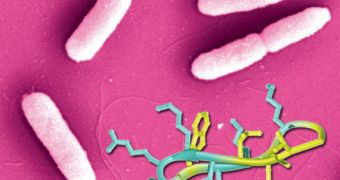Bacteria are tremendously capable organisms, able to withstand some extremely harsh conditions. They can basically learn how to thrive in any type of environment, which is why they occupy most of the globe, apart from the mantle and the interior of active volcanoes. Unfortunately, they can also adapt to specific types of antibiotics, and at times to antibiotics altogether. This is precisely the case of a bacterium called Pseudomonas aeruginosa, which is currently immune to anything we throw at it. But investigators have recently created a new type of drug that they say attacks the bacterium in a way that renders the pathogen's defense mechanisms useless, ScienceNow reports.
What's actually frightening is the fact that the bacterium lives almost everywhere. When people are healthy, their immune systems are strong enough to stop the pathogen from causing any serious harm. However, things change when other diseases set in that hamper the body's ability to defend itself. At that time, P. aeruginosa exploits any weakness relentlessly, causing a host of very severe medical conditions, and often death. Statistics have found it to be the fourth most common case of hospital-acquired infection, and it most often affects burn victims, as well as people suffering from leukemia and AIDS. In the last two cases, it produces pneumonia and septicemia, which often result in death.
Additionally, it is estimated that the bacterium is responsible for contributing to the vast majority of deaths from cystic fibrosis. One of the main reasons why researchers cannot destroy it is the fact that its cellular walls are, as they say, impenetrable. This means that whatever chemical doctors throw at it simply doesn't make it through, so as to have any sort of effect. Additionally, the pathogen also features cunning contraptions known as efflux pumps, whose sole purpose is to vent the cell of any unknown, foreign chemicals. As a direct result, many antibiotics considered too toxic for human use before are currently used to kill P. aeruginosa.
Recently, a research team at the University of Zurich has devised a new way to target the bacterial cells. The scientists, working together with colleagues from the Swiss-based pharmaceutical company Polyphor, started looking deeper into the possibility of using peptides to kill these resistant cells. These components already exist in the immune system, but they are broken down by the body very quickly, and are also dangerous in high amounts. Many teams have sought over the years to use artificial peptides, which relentlessly attack P. aeruginosa's walls, for destroying bacterial cultures, but have failed.
“Although the starting point for our work is often peptides and proteins from the natural world, we want to make something which is more stable, more effective, and less toxic,” John Robinsion, the UZ chemist that led the study, says. The group managed to synthesize an artificial molecule dubbed peptidomimetic that is perfectly able to disrupt a bacterial protein called LptD. This target has never before been investigated as a possible way into the bacterial cell. Mouse studies have revealed that the new approach is 100 percent effective, and that no side-effects occur. The peptidomimetic molecule does not attack healthy cells around the P. aeruginosa infection sites.

 14 DAY TRIAL //
14 DAY TRIAL //